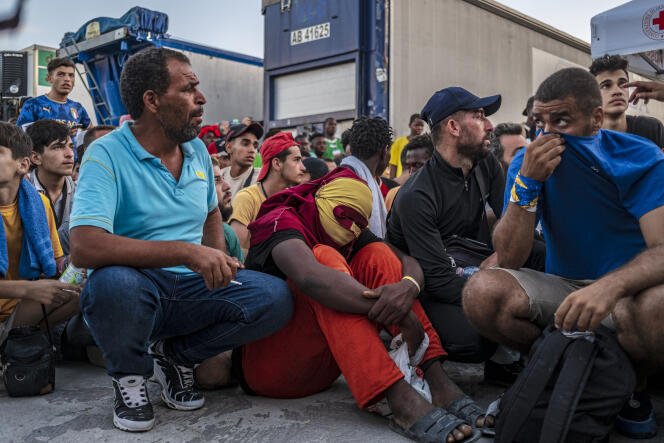


Over the past year, the central route – which passes through Lampedusa – has become the most popular for migrants seeking to reach Europe via the Mediterranean. Since January 2023, almost 130,000 people – including Guineans, Ivorians, and Tunisians – have arrived in Italy by sea, twice as many as at the same time last year. "We’re back to more or less the same arrival figures as in 2015 and 2016, and even then we were saying that this was in no way comparable to the 850,000 people who arrived in Greece in 2015," said Flavio Di Giacomo, spokesman for the International Organization for Migration (IOM) in the Mediterranean. "More recently, Italy absorbed the arrival of 120,000 Ukrainian refugees in three months very well," he added.
Di Giacomo believes that the current situation is "exceptional" for Lampedusa but not for Italy, and even less so on a European scale – even as Europe’s far-right cries "migratory submersion." In 2015 and 2016, "around 8% of people crossing arrived in Lampedusa," said Di Giacomo, "this year, it’s over 70%. There is a logistical and operational emergency."
The ten-point plan for Italy outlined by European Commission President Ursula von der Leyen in Lampedusa on Sunday, September 17, proposes to increase the resources of the European Union’s asylum and border surveillance agencies (Frontex) to speed up and facilitate the registration of migrants arriving in Italy. It also aims to facilitate the transfer of people to other member states on the basis of a voluntary solidarity mechanism and to implement the agreement signed on July 16 with Tunisia to help the latter better control the departure of migrants from its shores.
"Blocking departures is a short-term solution," said Di Giacomo, pointing out that the application of such solutions with Libya has only had a temporary effect. "Many sub-Saharan migrants are fleeing Tunisia, even though they used to live there, because of the dramatic situation there and, in particular, the discrimination against them," the IOM spokesman added. "There’s nothing new in what the Commission is proposing," said the environmentalist MEP Damien Carême, "it’s illusory. Ursula von der Leyen calls for voluntary solidarity between countries, but this has never worked, as commitments are not kept."
What everyone is waiting for, both in Brussels and in the capitals, is the final agreement on the asylum and migration pact that has been under discussion for four years now. "This pact is now on the right track," according to the Commission. "There is still a chance that it will be concluded before the end of the Commission’s mandate in June 2024," said a European diplomat. On September 28, the Council is due to adopt a final draft of rules in the event of a migratory crisis.
You have 37.73% of this article left to read. The rest is for subscribers only.
